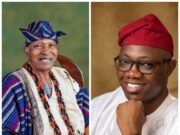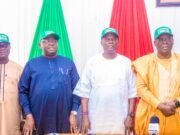My objective in this intervention is to deliberately go against the grain of political discourse regarding traditional rulers and traditional institutions in Nigeria. This is herculean, and is tantamount to fighting a battle simultaneously on two fronts. The essence of this piece is to make a case for the cultural status of the Alaafin of Oyo and the Alaafinate as a traditional agent with the requisite cultural and social capacities to instigate modernisation in Nigeria. This is a difficult task in the first place because traditional rulers are unarguably not the most popular of the elites today in the eyes of Nigerians, even as they have incredible hold on the traditional basis of authority that sustains the community structure nonetheless. From the Emirs in the Northern part of Nigeria to the Obas in the Southern part, and the Ezes and Obis in the East, the goodwill that these traditional elites used to enjoy have been seriously attenuated by the weight of opinion against their becoming constitutionally relevant in the political scheme of things in Nigeria.
The 1963 Republican Constitution specifically recognised the constitutional relevance of traditional leadership. For instance, the Oba of Lagos was made a member of the Senate. And this is apart from the Constitution approving the establishment of the regional House of Chiefs that allowed traditional rulers to participate in the constitutional matters of their regions. By the time the 1979 Constitution came into existence, there was already in place a rigorous discourse on why traditional rulers were no longer necessary as constitutional actors.
Paradoxically, one of the waves that culminated in this conclusion was the politically motivated dispute between Chief Obafemi Awolowo and the father of the present Alaafin. In 1945, Oba Adeyemi II Adeniran became the Alaafin of Oyo. In 1955, he was dethroned by the Awolowo-led Action Group. His sin, among others, was that he supported the National Council of Nigeria and the Cameroons (NCNC) rather than the AG. The fall out of the crisis was two-sided. On the one hand, while the crisis lasted, Awolowo was starved of the required support of the Oyo people and of the traditional institution that the Alaafin controlled, a dynamic that was later aggravated by the Awolowo and Akintola (SLA) political dispute. On the other hand, Awolowo initiated a political trajectory that led to starving the Alaafin of critical alliances and removing him from constitutional matters. He was eventually exiled to Lagos before the current Alaafin came to the throne and recuperated the traditional cultural support that was held in abeyance, while his father was in exile, not of course without some downsides that sometimes overplay the reach of traditional authority and tendencies to not want to accept the imperative of changes to tradition in the face of contemporary democratic reality and dynamics. We will draw the lesson from this experience shortly.
Those who are vehement about not allowing traditional leaders any constitutional role have their reasons. One of such, which seems so fundamental, is that tradition has no place in contemporary constitutionality. The traditional rulers have by that fact therefore exhausted their usefulness. And Nigeria is not a monarchy but a republic. This is all well and good. Such an argument is not strange because it is part of a body of development arguments called the modernisation thesis. The modernisation theory took firm root within the American social science literature of the 1950s. The theory attempts to specify the dynamics of transitioning from a traditional to a modern society. This transition is taken, especially in a theorist like W. W. Rostow, to follow a systematic and unilinear path: The starting point is that a society is first traditional or agricultural. We can call this a pre-industrial stage. This stage is followed by a period of entrepreneurial activities that serves as the precondition for takeoff. After this stage, we can then have the takeoff stage which would be characterised by rapid economic growth. The next stage, the period of maturation, is when economic development is slowly achieving a more constant speed. The last stage is that of mass consumption, when real income increases and real democratisation commences.
This path, for Rostow, is the same for all human societies wanting to transform from a traditional society to a modern one. And since European societies have already achieved such a modernisation, then it is left for all traditional societies, like those in Africa and the rest of the third world, to catch up by following the path that Europe followed. Under the relentless logic of rationalisation, religion and all other traditional institutions like the kingship will give way to modern secularity and technologies. Apart from the increasing urbanisation and industrialisation, the fundamental unit of the human society switches from the community and the family to the individual.
Social change will eventually sweep away all vestiges of traditionality and usher in an era of glowing modernisation unencumbered by any remnant of the past. In ideological terms, modernisation requires that everything about an indigenous culture — its memory, heritage, agency, and agenda for progress be destroyed in order to achieve its replacement by a western form of modernity.
Unfortunately for modernisation theorists, traditional culture and all its dynamics have refused to go away. On the contrary, religious fundamentalism and ethnic nationalisms have become a basic feature of the modern state that have hindered all the optimisms about development and democratic governance. One error or sin of the modernisation thesis is not only that it totally ignores the possibility of internal and external sources of development and social change, but it also undermines the possibility that the relationship between the traditional and the modern is not a binary relationship; that tradition and modernity cannot be so separated in the way that modernisation theorists have done; and that both constitute interdependent variables whose internal frameworks intersect each other.
And this returns us full cycle back to the significance of the Alaafin as the reference point for a traditionality framework without which modernisation in Nigeria is doomed. This is where the insights drawn from the Awolowo-Alaafin crisis of 1955 become prominent. For the few years while the crisis raged, Awolowo’s policies suffered a measure of popular support because the traditional structures were withdrawn from him. Even when the Alaafin went on exile to Lagos, there was still huge resentment by those who were loyal to the king. The argument here is that while traditional rulers have undermined their own relevance, it seems far-fetched to equate them with the traditional structures which could be deployed towards facilitating the democratic governance and development that modernisation promise. However, the larger argument is that it becomes fallacious to bring all traditional rulers under the label of disillusionment.
I wish to present the Alaafin as a traditional brand whose significance is one means by which we can begin to understand the modernity of tradition. And in this regard, I had earlier celebrated a number of traditional rulers with modernising missions. Indeed, the Awujale of Ijebuland’s role of a patron in the Ijebu Ode poverty alleviation programme is a notable brand to reference. And with the Ooni of Ife, Obi of Onitsha, the Emir of Kano, and a growing number of urbane, educated professional and cosmopolitan modern traditional rulers, we seem to be witnessing a resurgence of radical progressive traditional rulership, which is not content with occupying a sinecure status and an elitist opportunism with no political capital that could be deployed to reconnecting the people back to the democratic imperative in Nigeria. In this sense, I want to argue that Nigeria’s constitutional system, notwithstanding, traditional institutions like the Obaship have roles to play which cannot be interpreted as the rude intrusion of useless traditions. Whether we know it or not, the kingship is still a sociologically relevant traditional institution that wields sufficient local authority wherever it is found across Nigeria. We only need to access empirical statistics to buttress this argument. Oba, Emir, Obi and all other kingship statuses still constitute enormous cultural and political capital in several ways that our refusal to recognise them constitutionally will not affect. This will not be obvious if we only take a look at the Alaafin as an office that lacks constitutional significance or see the Alaafin as just one man. On the contrary, the Alaafinate is beyond any constitutional recognition, and it transcends just one man.
On the one hand, the office of the Alaafin stands as the majestic symbolisation of decades of Yoruba history and historicity in all its grand manifestations. On the other hand, and as a corollary, the present Alaafin is all in himself a trajectory of historical achievements. The third issue is the possibility that the Alaafin as the arrowhead of tradition and traditional structures implies for the reconfiguration of local governance in post-independence Nigeria. My worry is simple: In what way would a country develop if it neglects the many dimensions of its development capital, from women to the physically challenged to tradition and local governance? Indeed, as we speak, the only sustainable comparative advantage in economic terms that Nigeria can boast of is traditional arts and culture. Unfortunately, this has not been leveraged as proxy for innovation to rethink and deconstruct our fledging polity. Nigeria’s local governance structure is in tatters. The local government as the third tier of government is practically non-existent, and hence has short-circuited the delivery of democratic dividends to Nigerians, many of whom engage with local structures of governance on a daily basis.
This ought to provide sufficient pointer to the role of the Alaafin as the moderator of modernisation. And this is more so once we see through the camouflage of modernisation as the sum total of the colonial ideas of civilisation, reason, progress and development. Our problem in Nigeria, and more specifically Yorubaland, is not that we are not modernised. Indeed, we are hyper-modernised. However, we are not modern because we are psychologically dislocated from the substance of our history and culture. Within the ideological process of globalisation, what we call Yoruba culture has become an exotic commodity that we offer up as tourist item for the consumption of foreigners. It no longer served as the basis of our identity or self-recognition.
As a moderator, the status and the office of the Alaafin inject a crucial caution into a modernisation process that could become a runaway failure if unchecked. This becomes a critical observation within a postcolonial constitutional Nigeria where the local government as the third tier of government has been locked into a “residual” space that is devoid of any governance benefits. The states across Nigeria lord it over the local governments, and deprive them of any development initiatives.
However, the Alaafin could be the point at which subsidiarity as a democratic and development principle could intersect modernisation. For instance, the Mabogunje and Aboyade’s concept of OptiCom (for optimum community) rural development is a strategy that leverages on any community that has the most favourable complements of rural development elements, like the ease of mobilisation and social capital. Social capital in this context refers to the availability of trust, social reciprocity, networks of civic engagement. All these are in fact regular features of rural communities. The Alaafin wields enormous cultural influence which could be deployed into a governance capital by which the people can be galvanised into action.
Unfortunately, the Alaafin as connotation for the whole ensemble of traditional institutions and structures has been neglected by the Nigerian leadership on the altar of political correctness and constitutional closure. The pioneer modernised intelligentsias who reached their maturation between years 1880 and 1920 did not take attempts by the colonial masters to impose western culture lying low. They wanted to become modern, but on terms set by their own cultural heritage. Those pioneers therefore sought to entrench modernisation in the evolving Yoruba culture. Although mostly Christians, these intellectuals promoted African culture and in 1889 Lagos teachers resolved to wear only African dress. Many of them changed their English names to Yoruba ones: D.B Vincent became Mojola Agbebi, Edward Macaulay became Kitoyi Ajasa, G. Johnson came to be known as Osokele Tejumade Johnson, E.O.O. Moore changed his name to A.K. Ajisafe, while Alexander Johnson Williams assumed the name Oguntola Sapara. It was not only their names that they changed. They also pursued a modernised Yoruba cultural rebirth. J. F. Ade Ajayi called this a minor renaissance. This can truly be referred to as the first and only truly indigenous Cultural Revolution in modern Nigeria. In furtherance of their African Renaissance, they established a bureau for the dissemination of Yoruba indigenous knowledge, carried out researches and published a Yoruba knowledge system in history, arts, music, proverbs, philosophy, medicine, public administration, and medicine, among others. Samuel Johnson’s iconic book, History of the Yorubas, published in 1921, was a culmination of that struggle to defend African culture, redeem memory, and invest the modern Yoruba personality with pride and confidence. The book was a nationalist and anti-colonial project that sought to establish compatibility between the African personality and modernisation.
However, the second generation of colonised subjects, those who came of age between 1920 and 1950, went in the opposite direction of the first generation of colonised subjects. For most part, they abandoned the Cultural Revolution that the first generation had started in the late nineteenth century. This second generation included iconoclastic Christians and Muslims, Western-educated teachers and civil servants. Many members of that generation did not hide their disdain for local mythologies, cosmogonies and cosmologies. Late Ade Obayemi called some of them cultural agnostics who hold collective indigenous heritage of Nigeria in contempt. Unfortunately, for our country, these are the people, the educated elite who took over the reins of government, civil service, and education from the colonialists in 1950s. It is therefore not surprising that these postcolonial pioneers lacked the foresight and wisdom and the deliberate intention to decolonise our educational system, our body politic, and our social policies, on the relationship between culture and development.
If the 1920-1960 nationalist and anticolonial state of mind was preoccupied with the task of political freedom, the postcolonial agents (since 1960) focused on modernisation. Our first-generation post-independence political leaders pursued political and aesthetic decolonisation but not the decolonisation of the mind. They did not engage cultural decolonisation with the same vigour with which they articulated modernisation programmes through western education as the sine qua non. The curriculum for the most part maintained the colonial edifice. We continue to teach the Christian and Islamic literatures, history, and world views in our schools but never found it worthy to introduce indigenous philosophical literature into the curriculum as an autonomous discipline. This is further exacerbated by the deliberate near irrelevance of the traditional institutions, especially the kingship institution as the promoter of tradition and culture. There were genuine attempts to give them relevance, especially in the early days of self-government, with the constitutional roles for the traditional kingship institution but subsequently these strategic custodians of our cultural identities were shoved into irrelevance and it sounded the death knell for our cultural values and identities.
The jaundiced perception of modernisation by the second-generation nationalists created the foundation for the crippling of the emergence and operational effectiveness of democratic governance in Nigeria. Again, we look to the 1976 Dasuki Local Government Reform initiated by the Muhammed/Obasanjo regime. In summary, this reform took the initiative for local governance away from the local governments. First, the single-tier modality adopted for the local government areas essentially placed a uniform and central dynamics on local governance. Second, there was the introduction of statutory allocation from the Federation Account and State revenue. Third, the reform removed traditional rulers from the local government council by creating a separate traditional council. The cumulative effect of this legislative reform is the direct politicisation of local governance in a way that undermines the development of local government areas. First, there was the balkanisation of local government areas by those who did not want to miss out on the political largesse generated by statutory allocation to the local government councils. Second, the death knell of local governance was sounded by the time the Constitution required that the states take over the functions of the local government.
The idea of democratic governance is meaningful because it is conjoined to development, which has the people as its core essence. In other words, democratic governance is the ensemble of developmental processes, three of whose significant elements are local governance, rural development and wealth creation. Once these three elements have been undermined, then the whole idea of democratic governance becomes a charade. And this is essentially what the Nigerian Constitution has done. The local government system has become grossly irresponsible and irresponsive to the aspirations of Nigerians. The constitutional delimitation of executive, concurrent and residual lists makes nonsense of the principle of subsidiarity as a significant democratic and development paradigm.
Subsidiarity is a principle which, at its most general level, advocates that matters ought to be handled and adjudicated at the lowest level of competent authority. As a democratic principle, subsidiarity becomes an imperative for local participation in governance matters. As a development initiative, it insists that development matters could best be resolved at a decentralised level involving local administration. Subsidiarity resolves three basic governance problematics. First, it facilitates the ownership of development insights and paradigms. Second, it facilitates the instigation of self-reliance through the deployment of local ideas and innovation. Third, subsidiarity enables a bottom-up governance approach which in the long run helps the government itself strengthen its legitimacy quotient in the eye of the people.
Yet, traditional institutions constitute the basis for a vibrant local self-help and service delivery dynamics which cater to people’s expectations far above the capacities and capabilities of the apparatuses of the state. Communities call upon the traditional institutional framework, values and processes to cater to their many legitimate needs: ground their security networks in the form of the vigilante and neighbourhood watch groups; organise their health delivery systems; manage road construction and maintenance efforts; and initiate economic empowerment. For instance, the esusu microfinance scheme has become a veritable feature of modern financial assistance. All these constitute definite means through which the people attend to the search for developmental meaning for themselves and others. Once we recognise this fact, then it becomes easy to see how a vastly influential and powerful traditional ruler like the Alaafin could become a powerful vanguard of modernisation and local governance in a way that complements democratic governance. It is therefore in this sense that the Office of the Alaafin could be transformed into a huge brand for democratic rejuvenation.
‘Tunji Olaopa, a retired federal permanent secretary, is a professor of public administration at Lead City University, Ibadan; Email: tolaopa2003@gmail.com, tolaopa@isgpp.com.ng
This is excerpted from the keynote lecture delivered at the International Conference Organised by The Centre for Black Culture & International Understanding, Osogbo, on “The Alaafin in Yoruba History, Culture & Political Power Relations” at Ajayi Crowther University, Oyo, on 8-11 October, 2018.


































